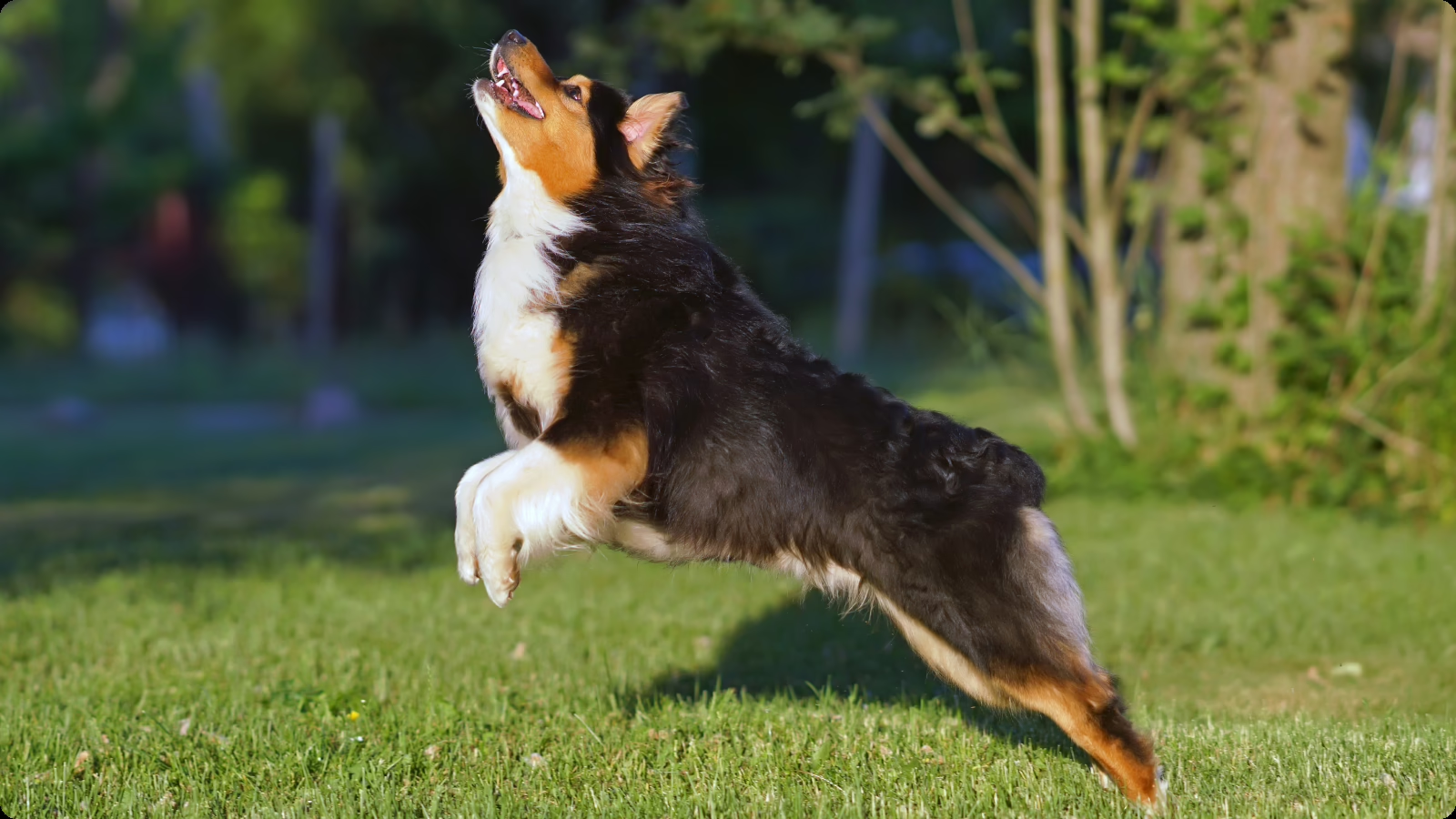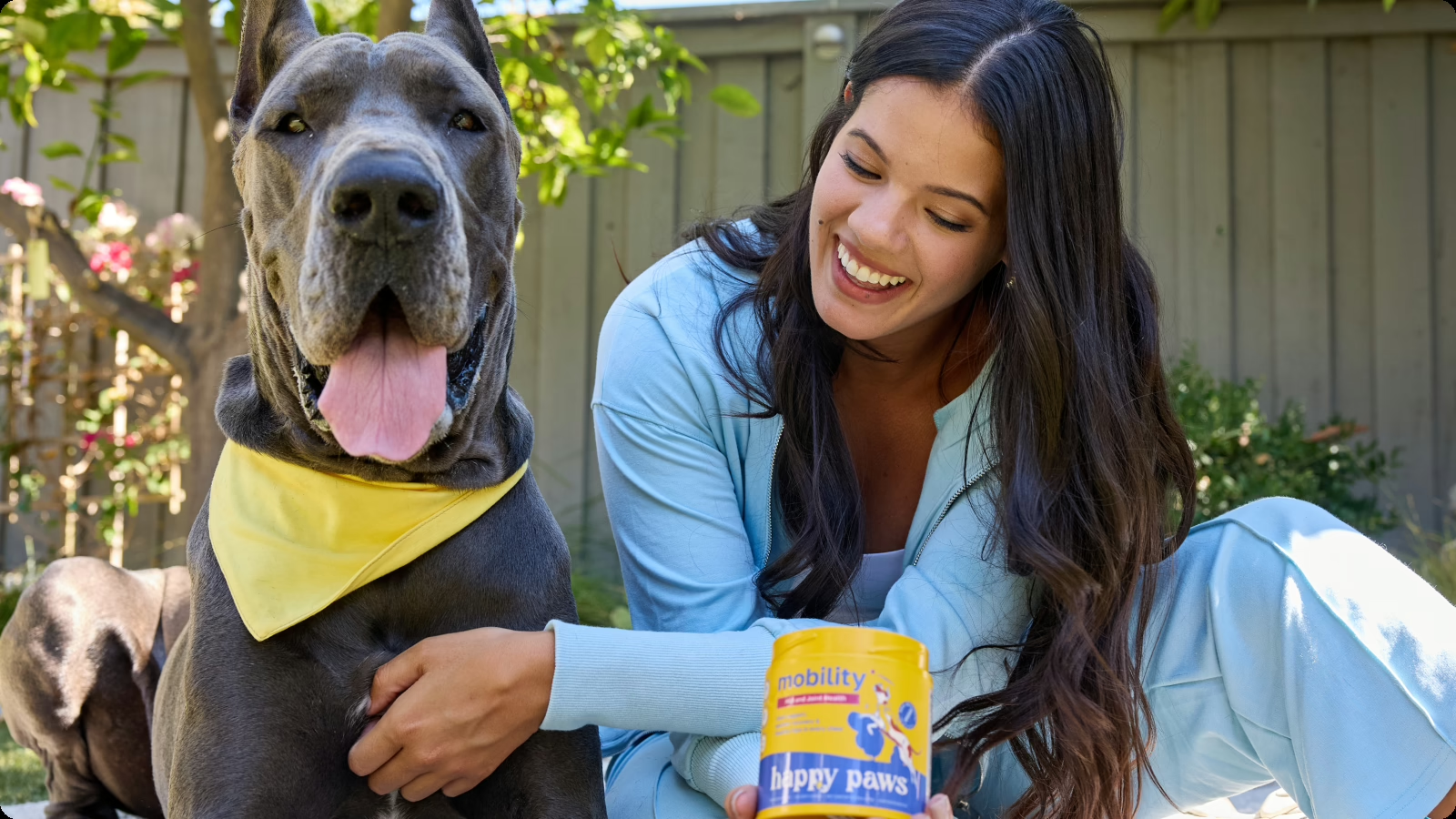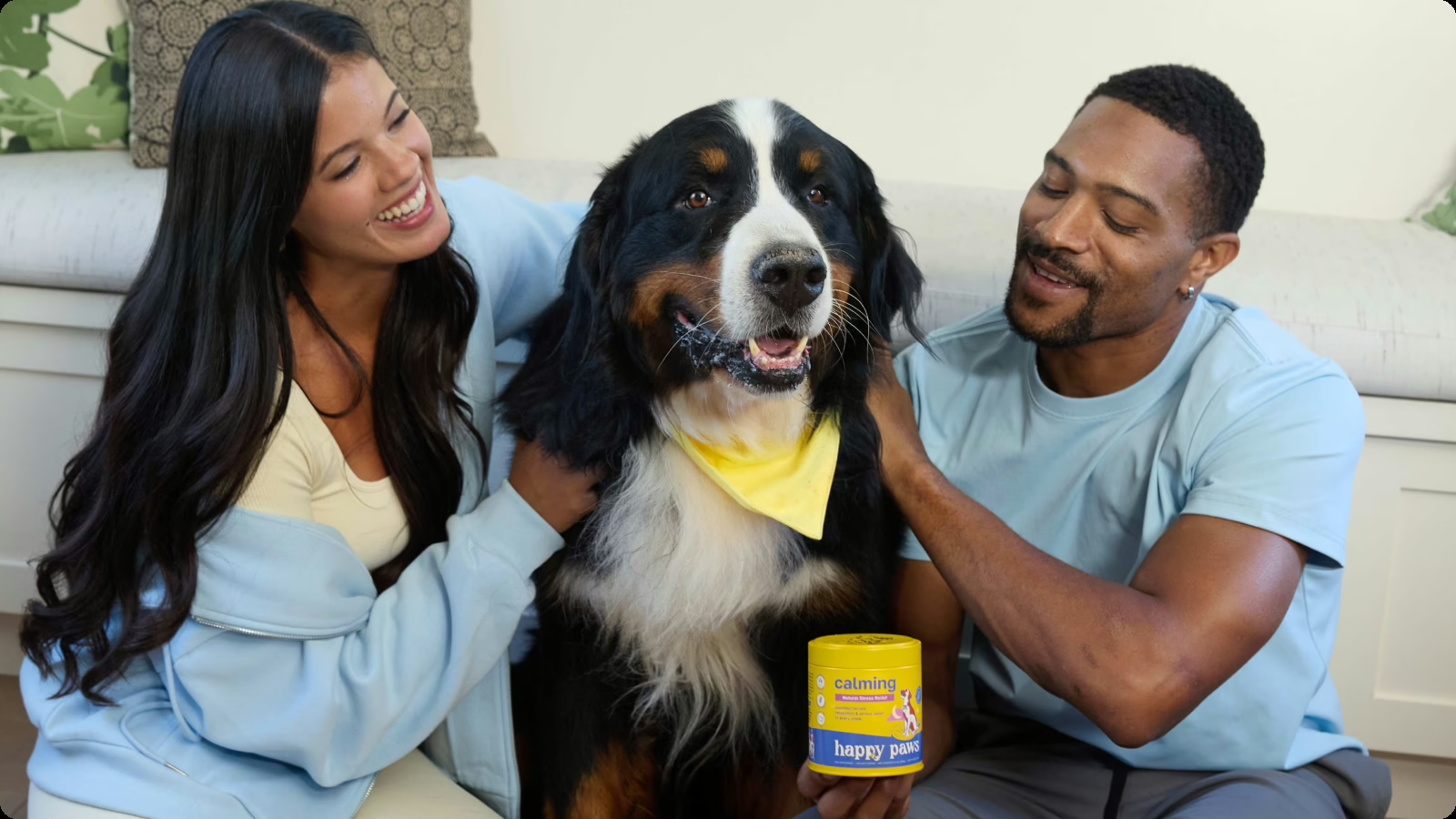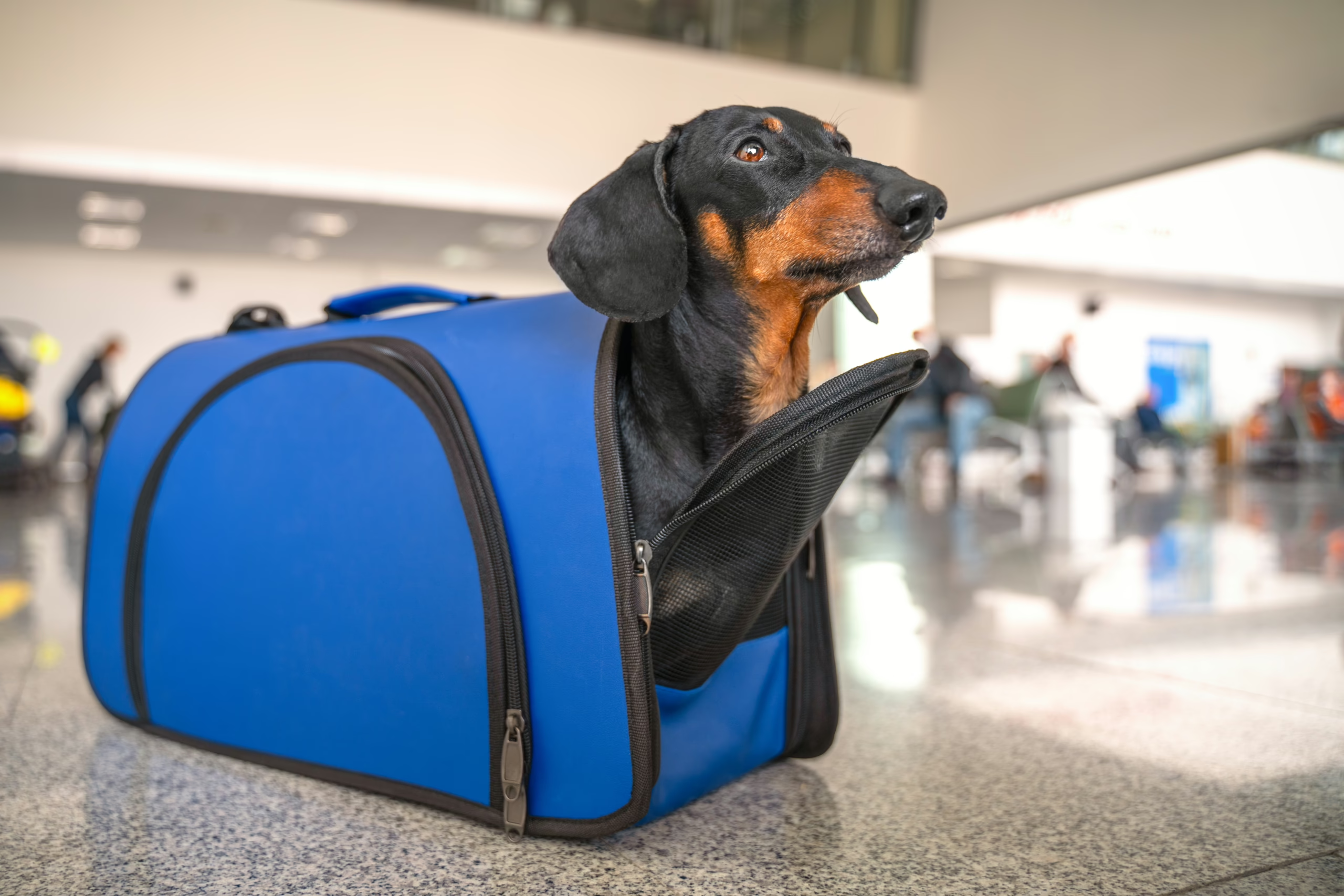Your dog’s stomach is strong, resilient, and robust. It can handle most (not all) things that your dog oh-so gracefully gives it, from insects to dirt to grass to the fries they took from your plate when you weren’t looking. But with age, the occasional canine bug, and a lack of daily nutrients, your dog’s stomach can lose its efficiency. This can lead to a number of digestive woes that may make your dog gassy, bloated, and urgently tap-dancing when Nature calls.
As pet parents, it’s best to know what signs to look for when your dog has tummy troubles. In this guide, we’ll show five signs to keep an eye out for, and a few suggestions on how to handle them, including probiotic supplements. Digestive woes happen for most dogs; they’re common from puppyhood to your dog’s golden years. But if your dog has consistent tummy troubles, it’s always best to consult your veterinarian. They’ll be able to help you discern your dog’s unique condition and recommend appropriate next steps.

Why Is Gut Health Important?
Much of your dog’s health depends on their gut bacteria. This microbiome exists all along your dog’s digestive tract, acting as the first line of defense to neutralize pathogens, viruses, and toxins from entering your dog’s system. When the microorganisms in your dog’s gut flora recognize healthy nutrients, like vitamins and minerals, they absorb them and deliver them to other parts of the body. This is how your dog’s digestive system bolsters systems like their brain and immune system. Without a fully functioning digestive system, these other areas won’t get the nutrients they need to keep your pupper in tip-top shape.
What Contributes to Your Dog’s Gut Health?
A few key factors play roles in helping support your dog’s gut health. Knowing what these are can help you feel a little more confident when addressing your dog’s digestive woes.
Diet
The main factor impacting your dog’s digestive health, and the only one you have control over, is your dog’s diet. Your dog gets all their necessary nutrients, like key vitamins and minerals, from their diet—or at least, they should. Today, dry dog food might put your dog into sport mode, barreling around the corner twice a day for breakfast and dinner, but the unfortunate truth is that most dry dog food lacks effective, essential nutrients. If dry kibble is their only food, they may miss key nutrients, which can weaken gut bacteria. This is where supplementation may help fill in those gaps. We’ll discuss more on supplementation below.
Age
As your dog ages, their body slows down; it’s only natural. It happens to us, too. Their systems get weaker and less efficient, focusing their limited resources on maintaining and preserving health. But with this slowdown, their gut health might not have the necessary number of microorganisms to help weed out toxins, pathogens, and bacteria from their digestive tract. And without a strong line of microorganism defense, your dog’s digestive health can take a dive, leading to common concerns like diarrhea, constipation, bloating, gas, and lowered immunity. Below, we’ll discuss how you can help bolster your dog’s digestive woes, even if they’re an older pupper.
Genetics
For some breeds, gastrointestinal problems can be a little more common than others. These digestive issues stem from a breed’s genetics, passed down from parents who either had the issues themselves or were merely carriers. Typically, these congenital conditions revolve around inflammation along the digestive tract. While certain supplementary diets can help your dog overcome these innate issues, it’s oftentimes a long, difficult journey. So, if you believe your dog was born with gastrointestinal problems, it’s best to consult a vet about proper dietary steps.
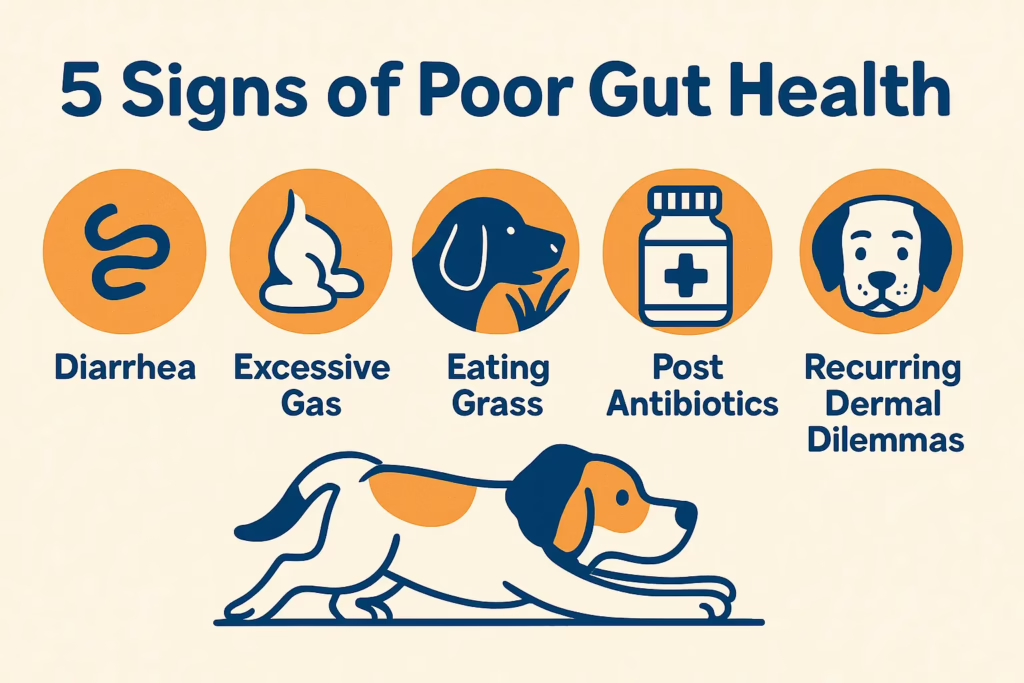
5 Signs of Poor Gut Health
Here are five common signs of poor gut health in dogs.
1. Diarrhea
The most obvious sign of a weakened microbiome is soft stool. Your dog’s urgent and frequent goings may stem from a canine bug they caught or a digestive system that is not up to snuff. For many dogs, diarrhea can clear up on its own; but still, if it persists for more than a few days, you may want to consider veterinary intervention. They might suggest supplementation or increasing your dog’s fiber intake.
2. Excessive Gas
Any dog owner will tell you that dog farts happen; they’re totally normal. But they typically occur on a routine basis. When they start happening more often, however, you may want to check out your dog’s diet, as most cases of long-term gas usually come from their diet.. Things like soybeans, dairy, spices, peppers, and high-fat foods can all lead to excessive fermentation in your dog’s colon, causing a build-up of gas. If your dog has bad gas that seemingly came out of nowhere, the first place to check is their diet.
3. Eating Grass
While their ancestors are ferocious meat eaters, your dog can sometimes nibble on the occasional blade of grass. But why? Well, the reports are conflicting, but many speculate that dogs gravitate toward grass because of its high fiber content. Your dog’s microbiome needs fiber to keep their digestive system running smoothly. When your dog’s diet doesn’t have enough fiber, they can often go hunting for it themselves, pulling on the leash to steal a blade or two of grass on your walks.
While some grassy spots are harmless, it’s best to curb your dog’s grass-eating habit early. Many grassy lawns and bushes, especially in urban areas, are sprayed with harmful chemicals.. These are not safe for dogs and shouldn’t be ingested.
4. Post Antibiotics
If your dog has just undergone—or is still in the midst of—a round of antibiotics, their gut health may be impacted. Inside your dog’s microbiome are trillions of healthy bacteria called probiotics that help foster gut function and digestive health. Veterinarians prescribe probiotics to neutralize harmful bacteria in your dog’s system, inevitably wiping out the good bacteria, too. While these prescriptions for dogs are necessary in many cases, they can disrupt your dog’s gut bacteria, leaving them with digestive problems for a few days or weeks.
5. Recurring Dermal Dilemmas
As we said before, your dog’s gut health is connected to other parts of the body. When your dog’s gut flora isn’t up to snuff, other areas might not be, too. One of the main markers of poor gut health is recurring dermal conditions, like itchy skin, hair loss, and more. While these problems can stem from a lack of nutrients, they can also point to a lack of absorption in your dog’s microbiome, which can be caused by low amounts of natural probiotics along their digestive tract.
When to See a Vet
Digestive problems can last for a day or two, or they can linger for weeks to months. They can appear once or twice every few years or sprout up consistently throughout your dog’s life. If you’re concerned about your dog’s digestive health, it’s best to consult a veterinary professional, especially if the problem persists.
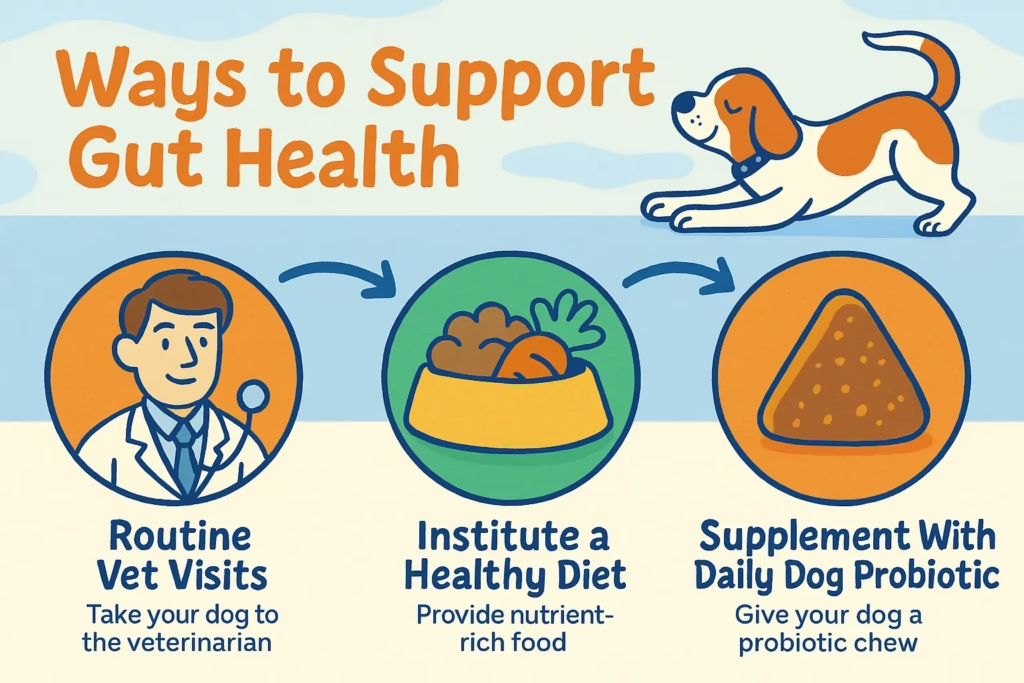
Ways to Support Gut Health
There are a few ways to support your dog’s gut health, most notably with veterinary intervention, a proper diet, and daily probiotic supplementation. Let’s break down each.
Routine Vet Visits
As we’ve stated before, the start of any dog’s journey to better gut health should start and end with a professional veterinary specialist. Vets are our best friends; they should be your dog’s, too! These trained men and women can help decipher your dog’s digestive woes and formulate a plan for next steps. Before considering a dietary change or necessary supplementation, it’s always best to consult your dog’s veterinarian.
Institute a Healthy Diet
The cornerstone of a dog’s daily health is their diet. Your dog needs vitamin-rich, nutrient-dense food to support them in puppyhood and maintain them during their golden years. While dry kibble is easiest, this doggy food isn’t always the most nutrient-packed. But thankfully, there are ways to beef up your dog’s daily nutrient intake, with the help of key supplements.
Supplement With Daily Dog Probiotic
Dog supplements range from helping the body absorb nutrients, from their skin and coat to their gut flora. These supplements are made for daily use and employ all-natural compounds to reinforce proper function in key areas of your dog’s system. Most notably, a dog probiotic can help restore digestive health and promote a healthy microbiome, leaving your dog with a reinforced number of gut-boosting bacteria.

What Is a Dog Probiotic?
Probiotics for dogs are supplements that contain healthy, active microorganisms with an array of beneficial, dog-friendly compounds, like fibrous, antioxidant-rich sweet potatoes. Probiotics are live bacteria that help keep your dog’s gastrointestinal tract in order, lending a helping hand to absorb nutrients better and filter out toxins. Probiotics supplements for dogs contain these natural microorganisms to help restore those lost with age, antibiotics, or the occasional canine bug. When taken daily, a probiotic supplement can help fortify your dog’s gut health, which, may help strengthen the immune system, according to the AKC.
Our Probiotic Dog Chews
Our Probiotic Dog Chews combine all that healthy, gut-boosting goodness into flavor-packed daily chews. These supplements use a blend of P-6 probiotics to fortify and enrich your dog’s gastrointestinal tract. Plus, they offer antioxidant-rich nutrients to settle digestion, relieve bloating, and even promote fresher breath. And all that’s wrapped up in a vegan chicken flavor that’ll win over any picky eater.
How to Give Your Dog Probiotics
The best ways to give your dog our Happy Paws Probiotic Dog Chews is either as a kibble topper or as a standalone treat. Just place a serving of the chews on your dog’s breakfast or dinner, or call them over, make ’em sit, and reward their good behavior with a tasty treat.
Don’t know how much to give your dog? Here’s a helpful guide broken down by weight.
| Happy Paws Supplement | Under 10 lbs. | 10–30 lbs. | 31–60 lbs. | 61–90 lbs. | 90+ lbs. |
| Probiotic Dog Chews | 1 soft chew per day | 2 soft chews per day | 3 soft chews per day | 4 soft chews per day | 5 soft chews per day |
Parting Thoughts
A dog’s digestive woes can be uncomfortable and unbearable for dogs and their owners. From frequent, urgent bathroom trips to indoor accidents to long-lasting issues, poor gut health can lead to a number of problems that hamper your pup’s overall health. And there are a few notable signs that point to poor gut health, like loose stool, excessive gas, grass eating, and more. Hopefully, this guide has given you the knowledge to notice these signs and the confidence to address them head-on with a proper doggy diet, probiotic supplements, and routine vet visits.

